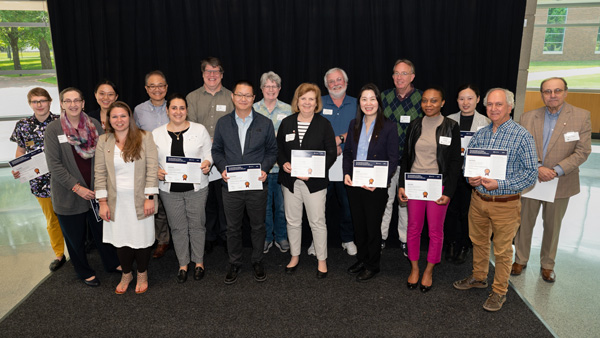For Bryant University’s dedicated community of teachers, class is never over. While Bryant’s students all headed home at the end of the semester, nearly 80 members of the Bryant faculty and staff, representing almost every course of study across the university’s College of Business, College of Arts and Sciences, and School of Health and Behavioral Sciences gathered on May 23 for the university’s 6th annual Teaching and Learning Summit, organized by Bryant’s Center for Teaching Excellence (CTE).
“This is just another indicator of how dedicated our faculty are to come back on the Tuesday after Commencement to engage in an open-minded discussion about exploring new concepts and working together, which is a very strong and important tradition at Bryant," said Bryant University President Ross Gittell, Ph.D., in his opening remarks.
The summit, says conference organizer, associate CTE fellow, and lecturer of English and Cultural Studies Ryan Marnane, is an opportunity for faculty to exchange ideas and support one another in a thoughtful and supportive atmosphere. “We want to stay on the cutting edge of innovative and inclusive teaching — and that requires us being constantly reflective, and to research what's going on, with regards to how we can best cultivate a space for our students for genuine, meaningful, and authentic learning and growth,” he says.
More than 20 members of the Bryant faculty presented at the summit, sharing experiences, advice, and lessons they’d gleaned on topics ranging from academic integrity to removing unnecessary barriers to learning to getting to know students. Other sessions walked attendees through a range of technology and tools to enhance student learning and growth.
“It’s all about using the tools, and teaching students to use the tools, in a way that we can be proud of.”
An early panel, moderated by Gao Niu, assistant professor of Actuarial Science, discussed the important role that the scholarship of teaching and learning can play as a resource for educators and encouraged the attendees to consider making their own contributions to the field. "Bryant has always recognized that the scholarship of teaching and learning is legitimate scholarship, which is not the case at a lot of other institutions," noted panelist and Associate Professor of History and Social Sciences Rich Holtzman.

There were also opportunities for faculty to work through new ideas and developments together. In one panel, Allison Papini, assistant director and manager of research and instruction services for Krupp Library and adjunct clinical associate professor, Professor of Marketing Stefanie Boyer, and Professor of English and Cultural Studies Martha Kuhlman, explored the practical and ethical considerations surrounding the rise of artificial intelligence and chatbots like ChatGPT.
At the beginning of the discussion, Marnane, who served as moderator, asked how many of the educators in the room were dealing with ChatGPT-related issues in their courses. More than half the audience raised their hand — reflecting a worldwide reckoning with the new technology. "This is a tool that can deepen our students' capacity for learning, yet it is also a tool that can easily be a replacement for our students learning and growth,” he noted.
Artificial intelligence, the panel agreed, is becoming an increasingly prominent part of the educational landscape, and educators must determine how to address it in their classrooms and assignments.
"We are preparing a new generation that is going to carry society forward and it is more important than ever that we ensure that they are ready and that we ignite the spark of curiosity in them."
“It’s all about using the tools, and teaching students to use the tools, in a way that we can be proud of,” reflected Boyer, who has used artificial intelligence as a teaching and training tool for her students and is the co-founder of RNMKRS, an artificial intelligence tool that helps sales students work through role plays that aid them in preparing for their futures.
The summit concluded with a ceremony honoring the 31 members of the Bryant faculty and staff that took part in the 2022-2023 Association of College and University Educators’ (ACUE) Effective Teaching Practices course, which helps educators learn about and implement approaches that improve engagement and persistence and promote deeper, more inclusive learning. To date, more than 60 members of the Bryant community have completed the year-long program.
It is that level of commitment to teaching demonstrated by the honorees, stated Provost and Chief Academic Officer Rupendra Paliwal, Ph.D., in his closing remarks, that sets the university apart. “It is an awesome responsibility that we have to make a difference in the lives of our students," he said. "We are preparing a new generation that is going to carry society forward and it is more important than ever that we ensure that they are ready and that we ignite the spark of curiosity in them."